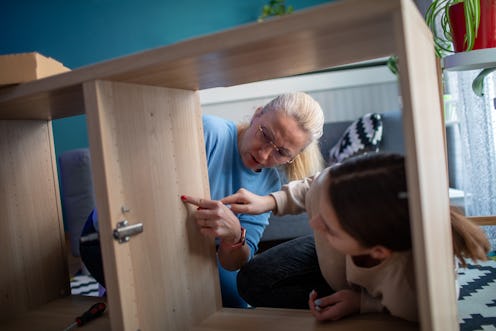
The family is often considered a site for upholding American traditions, including gendered ones. So, it comes as no surprise that there are many ways gender norms affect our families. In our culture, gender norms dictate everything from what kind of families people start to how they raise their kids and what relationships they have with them as adults — but the standards set by these norms aren't always helpful. Indeed, oftentimes, they can be downright harmful.
The gender norms governing family relationships are not the same everywhere and haven't been the same forever. For example, the idea that one mother and father are responsible for raising a child is fairly new. Living with extended family used to be more common in the United States, and a Pew Research analysis of census data actually shows it could be making a comeback. If you go back even further, many hunter-gatherer societies did and still do set children up to be raised by an entire tribe — not by solitary
In fact, even in our own culture, a lot of us don't have the families that gender norms say we should have. Many of us grew up with single parents, divorced parents, same-sex parents, or extended family. Nevertheless, gender norms have a way of creeping into even non-traditional families. Here are some ways they could be damaging your family relationships.
1. They Dictate That Women Be The Primary Caretakers...
Since gender norms encourage women to be warm, nurturing, and oriented toward the home, many of us spend more time with our mothers and other female relatives than with our male relatives growing up. This applies to extended family as well as the so-called "nuclear family." You rarely hear, for example, about Grandfather's famous chicken soup. While these relationships with mothers, grandmothers, and aunts are near and dear to many of us, the downside is that women experience undue pressure to be dedicated homemakers and caretakers in addition to or instead of being career-oriented.
2. ...And They Dictate That Men Be The Primary Breadwinners
The flip side of the pressure women feel to be more involved in the home is that men have been encouraged to put work above family, which means that many people's fathers, grandfathers, and uncles weren't around as much as their mothers, grandmothers, and aunts. Like caring for a family, supporting a family is a beautiful role to be appreciated, but it can also make men less close with their families than they could be and force them to work more than is healthy.
3. They Delineate Family Relationships By Gender
Overall, gender norms prescribe that most children will be closer with their mothers (though that prescription doesn't always come to fruition), but in certain ways, people are also expected to be closest with whatever family members share their gender. Boys are supposed to go fishing with their dads, while girls go shopping with their moms. Brothers play sports together while sisters do one another's makeup. And when it comes to confiding in older relatives about relationships, sex, and other personal matters, people are supposed to seek out someone of the same gender. This provides an early foundation for us to gender our friendships and other relationships and to view the other gender as alien to us.
4. They Narrowly Define What A Family Even Is
As I mentioned, traditional American gender norms dictate that a family is a man and a woman who are married with kids. In reality, less than half of kids in this country have that kind of family, according to Pew Research. But while non-traditional families may be normal, they're far from accepted. Single parents, same-sex parents, adoptive parents, and polyamorous parents are still stigmatized, as are people who don't have parents or choose not to associate with them because they've found a more supportive family unit on their own. Ultimately, a family limited by gender norms is one that limits us as human beings, since it stops us from seeking out the relationships we want with the people we truly want to have them with.
Images: vgajic/E+/Getty Images; Giphy